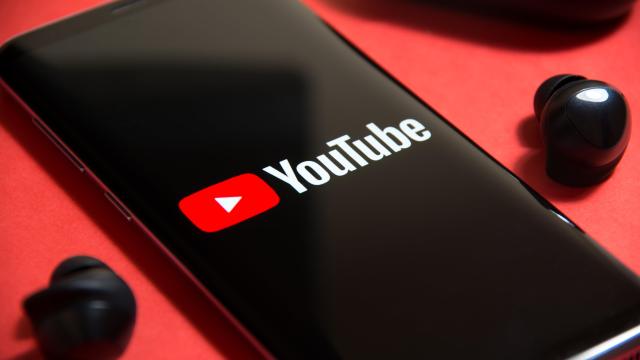As AI-generated songs run rampant across the internet, YouTube looks to get in front of it by legally licensing out artist voices. The platform developed a tool powered by artificial intelligence that would reproduce the vocals of musical artists, allowing fans to have them sing whatever they want, but talks with major labels have apparently slowed.
The YouTube tool, which is currently unnamed, will be trained using songs from artists obtained through their labels, according to a Bloomberg report Wednesday. Confidential talks indicate that the tool is a ways away from a release. Major record labels reportedly have yet to sign away the rights from the rosters of artists.
YouTube hoped to unveil the tool at its Made on YouTube event last month, according to a report from Billboard. The other labels reportedly involved in discussions are Sony Music Entertainment, Universal Music Group and Warner Music Group.
YouTube did not immediately return Gizmodo’s request for comment on the voice tool.
WMG CEO Robert Kyncl previously stated that the music industry should embrace AI. Kyncl is also a YouTube alum, having served as the company’s chief of business for over a decade.
YouTube is reportedly looking to keep the beta rollout tight. The company will apparently only allow a select group of creators to use the tool in videos, mimicking the voices of a select group of artists. YouTube also wants these artists to serve as project advisors of sorts who will provide feedback to the company on where to take AI beyond this voice generator.
As it stands, the music industry is pretty torn on this whole AI thing. In August, it was revealed that Google and Universal Music Group were in talks to license artist voices to recreate their vocals with artificial intelligence using a piece of software. With this tool, fans can create any song they want using their favourite artist’s voice, but that artist will receive compensation as a copyright holder. Similarly, Google and UMG furthered their partnership with the incredibly vague YouTube incubator that will see artists guide YouTube’s approach to dealing with AI-generated music content. UMG’s attempts to lasso the bucking bronco of AI comes after the record label asked streaming services like Spotify and Apple Music to stop letting machine learning train on their services. Some artists and producers, however, see AI more as a tool and less as a threat.
“AI is the big wave that’s coming for everything at the same time, and it causes a lot of fear and paranoia, but at the same time, it’s also a powerful tool,” hip-hop producer Bobcat Goldwav told Gizmodo in an interview this summer. “I try to not focus so much on the fear of the inevitable because I’m just a producer. I cannot stop the wave of AI, but I can try to implement it into my setup to allow me to do what I better.”
Fake tracks have been running rampant across the internet. Earlier this year, leaked Frank Ocean tracks were sold on Discord for thousands of dollars, only for it to later be revealed that those songs were completely fabricated with artificial intelligence. Meanwhile, in April, an AI-generated collaboration between Drake and The Weeknd called “Heart on My Sleeve” went viral before being pulled from streaming platforms.
